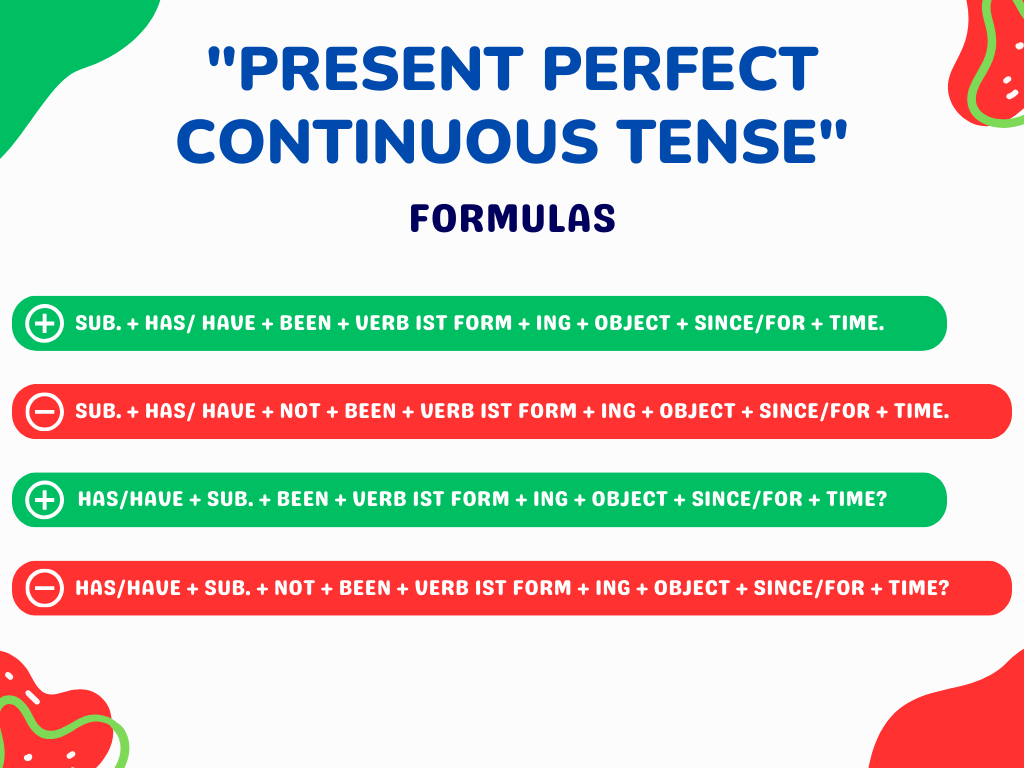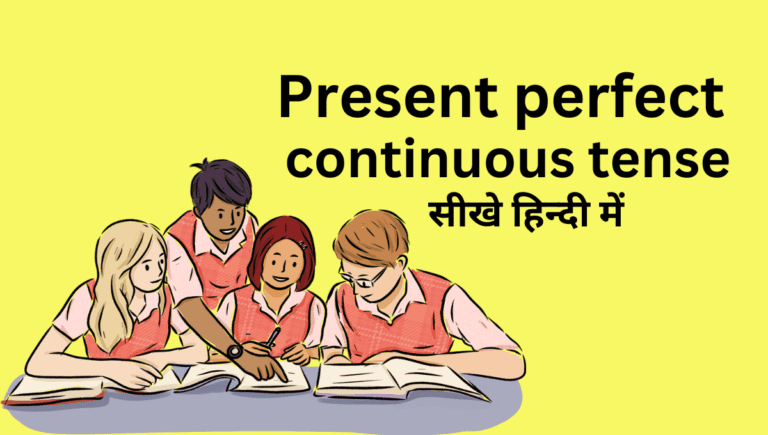हैलो दोस्तों इस पोस्ट में हम प्रेजेंट परफेक्ट कंटीन्यूअस टेन्स को हिन्दी (present perfect continuous tense in Hindi) में सीखेंगे। और साथ ही साथ present perfect continuous tesne की परिभाषा (definition), उपयोग (uses), सूत्र (formula), और वाक्यों में उदाहरण (sentences examples) भी सीखेंगे। इससे पहले हमने Present Perfect Tense सीखा था।
तो चलिए इस पोस्ट (present perfect continuous tense in Hindi to English) में जानते है, की present perfect continuous tense क्या होते है। इनका उपयोग कब किया जाता है, और हम इनकी पहचान कैसे कर सकते है।
Present perfect continuous tense in Hindi
Present perfect continuous tense (पूर्ण-अपूर्ण वर्तमानकाल), present tense (वर्तमान काल) का चौथा tense (काल) है। जैसा कि आप नीचे देख सकते है:
वर्तमान काल (Present tense) के चार प्रकार-
- Simple present tense (सामान्य वर्तमानकाल)
- Present continuous tense (अपूर्ण वर्तमानकाल)
- Present perfect tense (पूर्ण वर्तमानकाल)
- Present perfect continuous tense (पूर्ण-अपूर्ण वर्तमानकाल)
Present perfect continuous tense की परिभाषा
पूर्ण-अपूर्ण वर्तमानकाल की परिभाषा (definition)- वह काल जिसमें कोई कार्य भूतकाल में प्रारंभ होकर वर्तमान समय तक लगातार चलता रहता है। उस काल को Present perfect continuous tense (पूर्ण-अपूर्ण वर्तमानकाल) कहते है। इस टेन्स में कार्य के शुरू होने का समय दिया जाता है।
जैसे –
- बच्चे दो घंटे से पढ़ाई कर रहे है। (Children have been studying for two hours.)
ऊपर दिए गए वाक्य में कार्य (पढ़ाई करना) भूतकाल (2 घंटे पहले) में प्रारंभ होकर वर्तमान में लगातार हो रहा है।
Present perfect continuous tense meaning in Hindi
प्रेजेंट परफेक्ट कंटीन्यूअस टेंस (Present perfect continuous tense) का हिंदी अर्थ होता है- “पूर्ण-अपूर्ण वर्तमानकाल”।
Present perfect continuous tense की पहचान
जिन हिन्दी वाक्यों के अंत में रहा है, रही है, रहे है आदि शब्द आते है, तथा कार्य के शुरू होने का समय दिया जाता है। वहाँ present perfect continuous tense होता है।
सामान्य शब्दों में कहे तो present perfect continuous tense में कार्य भूतकाल में प्रारंभ होता है। और वर्तमान समय में भी चलता रहता है।
Present perfect continuous tense का उपयोग
प्रेजेंट परफेक्ट कंटीन्यूअस टेंस (Present perfect continuous tense) का उपयोग करते समय हमें निम्न बातों का ध्यान रखना चाहिए:
- इस टेन्स में सहायक क्रिया के रूप में has been या have been का उपयोग होता है।
- इस टेन्स में क्रिया (verb) की 1st form के साथ ing का उपयोग किया जाता है।
- इस टेन्स में दिए गए निश्चित समय के लिए since और अनिश्चित समय के लिए for का उपयोग करते है।
Note:
सहायक क्रियाएं has been और have been का उपयोग इस प्रकार किया जाता है:
- Has been – he, she, it, name, और एकवचन संज्ञा (singular noun) के साथ।
- Have been – I, we, you, they, और बहुवचन संज्ञा (plural noun) के साथ।
समय दर्शाने के लिए since और for का उपयोग इस प्रकार किया जाता है:
- Since – निश्चित समय के लिए उपयोग किया जाता है। निश्चित समय जैसे- सुबह, दोपहर, श्याम, रात, दिनांक, दिनों, महीनों के नाम आदि के साथ since का उपयोग किया जाता है।
- For – अनिश्चित समय के लिए उपयोग किया जाता है। अनिश्चित समय जैसे- 2 घंटे, 2 महीने, 4 दिन ,30 मिनिट आदि के साथ for का उपयोग किया जाता है।
Present perfect continuous tense के formulas

Subject + has/ have + been + verb 1st form + ing + object + since/for + time. (for positive sentence)
Subject + has/ have + not + been + verb 1st form + ing + object + since/for + time. (for negative sentence)
Has/Have + subject + been + verb 1st form + ing + object + since/for + time? (for interrogative sentence)
Has/Have + subject + not + been + verb 1st form + ing + object + since/for + time? (for interro-negative sentence) {Or}
Has/Have + not + subject + been + verb 1st form + ing + object + since/for + time? (for interro-negative sentence)
Types of sentences in “present perfect continuous tense“
Present perfect continuous tense के वाक्यों को चार भागों में बाँटा जा सकता है:
Present perfect continuous tense sentences in Hindi –
- Positive sentence (सकारात्मक वाक्य)
- Negative sentence (नकारात्मक वाक्य)
- Interrogative sentence (प्रश्नवाचक वाक्य)
- Negative Interrogative sentence (नकारात्मक प्रश्नवाचक वाक्य)
Positive sentence
Formula
Subject + has/ have + been + verb 1st form + ing + object + since/for + time.
Example in Hindi and English
1.) मै 2 घंटे से क्रिकेट मैच देख रहा हूँ।
1.) I have been watching cricket match for 2 hours.
2.) वह 3 घंटे से किताब पढ़ रही है।
2.) She has been reading the book for 3 hours.
3.) वे सुबह से क्रिकेट खेल रहे है।
3.) They have been playing cricket since morning.
4.) रवि एक महीने से दुनिया घूम रहा है।
4.) Ravi has been travelling the world for a month.
5.) वह कल रात 10 बजे से सो रहा है।
5.) He has been sleeping since 10 o’clock last night.
ऊपर दिए गए वाक्यों में हमने has been/have been और verb की 1st form के साथ ing का उपयोग किया है, और अंत में since/for के साथ समय जोड़ा है।
Negative sentence
Formula
Subject + has/ have + not + been + verb 1st form + ing + object + since/for + time.
Example in Hindi and English
1.) मै 2 घंटे से क्रिकेट मैच नहीं देख रहा हूँ।
1.) I have not been watching cricket match for 2 hours.
2.) वह 3 घंटे से किताब नहीं पढ़ रही है।
2.) She has not been reading the book for 3 hours.
3.) वे सुबह से क्रिकेट नहीं खेल रहे है।
3.) They have not been playing cricket since morning.
4.) रवि एक महीने से दुनिया नहीं घूम रहा है।
4.) Ravi has not been travelling the world for a month.
5.) वह कल रात 10 बजे से नहीं सो रहा है।
5.) He has not been sleeping since 10 o’clock last night.
ऊपर दिए गए वाक्यों में हमने has not been/have not been और verb की 1st form के साथ ing का उपयोग किया है, और अंत में since/for के साथ समय जोड़ा है।
Interrogative sentence
Formula
Has/Have + subject + been + verb 1st form + ing + object + since/for + time?
Note- Interrogative sentence में हमेशा प्रश्नवाचक चिन्ह (?) लगता है।
Example in Hindi and English
1.) क्या मै 2 घंटे से क्रिकेट मैच देख रहा हूँ?
1.) Have I been watching a cricket match for 2 hours?
2.) क्या वह 3 घंटे से किताब पढ़ रही है?
2.) Has she been reading the book for 3 hours?
3.) क्या वे सुबह से क्रिकेट खेल रहे है?
3.) Have they been playing cricket since morning?
4.) क्या रवि एक महीने से दुनिया घूम रहा है?
4.) Has Ravi been traveling around the world for a month?
5.) क्या वह कल रात 10 बजे से सो रहा है?
5.) Has he been sleeping since 10 o’clock last night?
ऊपर दिए गए वाक्यों में हमने has been/have been और verb की 1st form के साथ ing का उपयोग किया है, और अंत में since/for के साथ समय जोड़ते हुए प्रश्नवाचक चिन्ह (?) लगाया है।
Negative Interrogative sentence
Formula
Has/Have + subject + not + been + verb 1st form + ing + object + since/for + time?
{Or}
Has/Have + not + subject + been + verb 1st form + ing + object + since/for + time?
Note-
- Negative interrogative sentence में हमेशा प्रश्नवाचक चिन्ह (?) लगता है।
- Negative interogative sentence को interro-negative sentense भी कहते है।
Example in Hindi and English
1.) क्या मै 2 घंटे से क्रिकेट मैच नहीं देख रहा हूँ?
1.) Have I not been watching a cricket match for 2 hours?
2.) क्या वह 3 घंटे से किताब नहीं पढ़ रही है?
2.) Has she not been reading the book for 3 hours?
3.) क्या वे सुबह से क्रिकेट नहीं खेल रहे है?
3.) Have they not been playing cricket since morning?
4.) क्या रवि एक महीने से दुनिया नहीं घूम रहा है?
4.) Has Ravi not been traveling the world for a month?
5.) क्या वह कल रात 10 बजे से नहीं सो रहा है?
5.) Has he not been sleeping since 10 o’clock last night?
ऊपर दिए गए वाक्यों में हमने has not been/have not been और verb की 1st form के साथ ing का उपयोग किया है, और अंत में since/for के साथ समय जोड़ते हुए प्रश्नवाचक चिन्ह (?) लगाया है।
Present perfect continuous tense examples in Hindi
नीचे आपको कुछ ओर प्रेजेंट परफेक्ट कंटीन्यूअस टेंस के हिन्दी उदाहरण (present perfect continuous tense examples in Hindi) दिये गये है:
1.) माँ सुबह से घर का काम कर रही है।
1.) Mother has been doing household work since morning.
2.) वह 30 मिनट से व्यायाम कर रहा है।
2.) He has been exercising for thirty minutes.
3.) क्या वह दोपहर से मुझे याद कर रहा है?
3.) Has he been missing me since afternoon?
4.) शिक्षक पिछले 4 घंटे से कक्षा में पढ़ा रहे है।
4.) The teacher has been teaching in the class for the last four hours.
5.) क्या तुम 1 घंटे से गाड़ी चला रहे हो?
5.) Have you been driving for 1 hour?
6.) वह दो दिन से नाचने का अभ्यास कर रही है।
6.) She has been practicing dance for 2 days.
7.) क्या वह एक हफ्ते से कॉलेज जा रहा है?
7.) Has he been going to college for a week?
8.) राम बहुत समय से तुम्हें कॉल कर रहा है।
8.) Ram has been calling you for a long time.
9.) क्या वह शाम से तुम्हारे साथ बाते कर रहा है?
9.) Has he been talking with you since evening?
10.) वह कई हफ्तों से पौष्टिक भोजन कर रहा है।
10.) He has been eating nutritious food for several weeks.
Present perfect continuous tense F&Qs
Present perfect continuous tense का हिन्दी अर्थ होता है- “पूर्ण-अपूर्ण वर्तमानकाल”।
Present perfect continuous tense की सहायक क्रियाएं “has been और have been” है। और इनका उपयोग निम्न प्रकार किया जाता है:
Has been – he, she, it, name, और एकवचन संज्ञा (singular noun) के साथ।
Have been – I, we, you, they, और बहुवचन संज्ञा (plural noun) के साथ।
जिन हिन्दी वाक्यों के अंत में रहा है, रही है, रहे है आदि शब्द आते है, तथा कार्य के शुरू होने का समय दिया जाता है। वहाँ present perfect continuous tense (पूर्ण-अपूर्ण वर्तमानकाल) होता है।
Conclusion
इस पोस्ट में हमने प्रेजेंट परफेक्ट कंटीन्यूअस टेंस को हिन्दी और अंग्रेजी में (present perfect continuous tense in Hindi to English) सिखा। और साथ ही प्रेजेंट परफेक्ट टेंस की परिभाषा (definition), उपयोग (Uses), फॉर्मूला (formula) और वाक्यों में उदाहरण (sentences example) सीखे।
हमे आशा है, की आपको यह पोस्ट (present perfect continuous tense in Hindi) पसंद आयी होगी। आपको यह पोस्ट कैसी लगी हमें कमेन्ट में जरूर बताए और इसे अपने दोस्तों के साथ शेयर जरूर करें।
Present Tense (वर्तमानकाल)






